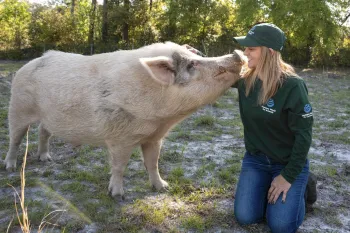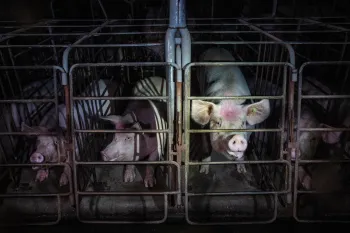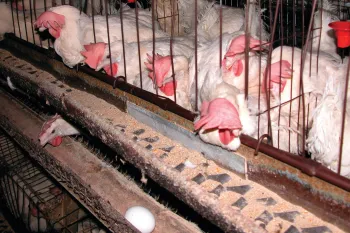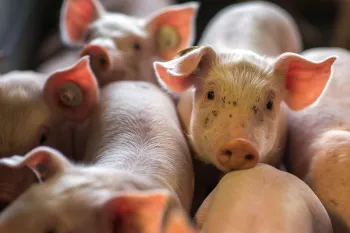For decades, we have advocated on behalf of animals raised and killed for meat. One of our earliest campaigns, back in the 1950s, was to ban the worst forms of slaughter, which culminated in passage of the Humane Methods of Slaughter Act. In recent years, we have campaigned to ban the cruel confinement of farm animals, including pregnant pigs in gestation crates, which are essentially cages so small that the animals can barely move. Wins in this area, from corporate campaigns to public policy, have reduced the suffering of millions of pigs. Karla Dumas is vice president of our Farm Animal Protection U.S. team, as well as the founder of a farm animal sanctuary. Here she shares why the fight for pigs is both a professional and personal passion for her.
Six years ago, when he was just a number, a piglet later named Milo was crammed onto a transport truck with hundreds of other pigs bound for a factory farm in the Midwest. They had already had their tails chopped off, a common practice. The plan was to raise the piglets for five months, while they grew larger, and then send them to a slaughter facility.
But the truck crashed. Most of the piglets died. Milo was one of just a few who survived the accident. And that’s when his life took a turn.
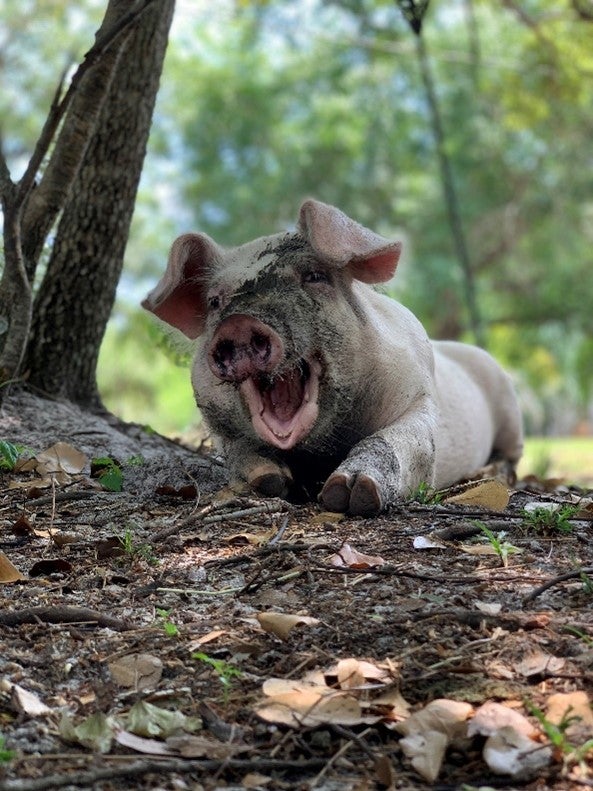
Karla Dumas
Milo came to my farm animal sanctuary to live his life as a member of our rescued herd. Today, Milo weighs more than 800 pounds, but he still expresses his inner piglet whenever possible, as he loves to plonk down at my feet for stomach rubs and back massages.
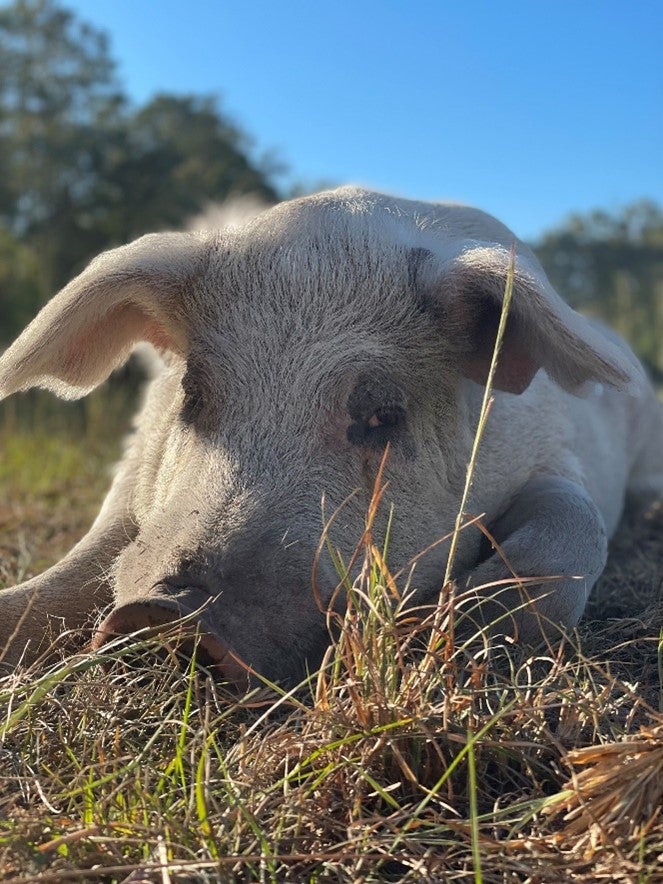
Karla Dumas
More than one billion pigs are killed for food globally each year. At such an enormous scale, anything we can do to reduce their suffering makes a crucial difference in the lives of so many.
Pig’s day in court
In 2023, we celebrated a historic victory when the Supreme Court of the United States rejected the pork industry’s challenge to California’s Proposition 12, a law passed in 2018 by ballot initiative. Proposition 12 prohibits the in-state production and sale of products produced via intensive confinement of mother pigs, egg-laying chickens and veal calves.
In support of Proposition 12, hundreds of veterinarians and animal welfare scientists submitted a brief in the U.S. Supreme Court explaining that animals cannot thrive when crammed into small cages. “Gestation crates hurt pigs,” they wrote. “Dozens of peer reviewed studies provide clear scientific evidence, using well-established indicators, that the welfare of a pig confined to a gestation crate is poor for most of her life. Gestation crates deny pigs the ability to engage in almost every natural behavior. Even the minimal movement of turning around (which a pregnant pig will do almost 200 times a day if given room) becomes impossible.”
Confining pigs to crates so small the animals can’t even turn around “induc[es] high levels of stress,” explains another amicus brief submitted by the American Public Health Association and other public health sector organizations. Stress “severely suppresses” the pigs’ immune systems, making them “more susceptible to disease,” which poses alarming health and safety risks for humans as “infectious diseases will persist in the piglets through slaughter without detection, resulting in pork products contaminated with pathogens carried by piglets.” Moreover, pigs are “ideal mixing vessels for various strains of influenza virus, including human influenza.”
You’d think the story should have ended there. Instead, the battle has shifted to the halls of the U.S. Congress where a faction of the pork industry, disgruntled with the Supreme Court loss, is trying to undermine laws like those banning the sale of gestation crate pork. And additional challenges to more than a dozen state laws on animal welfare and public health are popping up across the U.S. But just as we’ve defended progress to end intensive confinement, we will be there to meet these challenges with the determination needed create a more humane future for animals and for the many millions of people who care about how animals are treated.
Reasons to go hog wild for pigs
Study after study shows that pigs are intelligent, emotional beings. Some pigs have even learned how to play video games by manipulating a joystick with their snouts, with a tasty snack as a reward! I currently have 24 pigs at my sanctuary, and though I’ve never tried to teach them to play Mario Bros., I can attest to their wonderful personality traits: they are curious, playful and crave connection. I’ve learned that pigs make a variety of sounds to communicate with one another, and it’s easy to start sensing their range of moods, very much like dogs and cats.
Gigi, who was found under a highway bridge in Tampa, where she likely jumped or fell from a transport vehicle headed to a factory farm, quickly befriended another pig at our sanctuary, Gabriel, who was unbelievably loving and gentle with her. Walter Christopher is another pig here who shows a strong capacity to bond with people. Memphis and Marlow arrived at my sanctuary extremely fearful and untrusting after their rescue from a farm where they were apparently neglected, but with time they learned to love and trust their caretakers. They are extremely bonded and rarely leave each other’s side. And Dahlia, likely the most extroverted and active pig at my sanctuary, is always up to something, whether it’s running around with “zoomies,” rooting for delicious snacks or building a nest during the winter months.
I feel lucky to know these animals, and incredibly honored to work to make change for their kind.
Karla Dumas is vice president of farm animal protection at Humane World for Animals in the U.S.
Meredith Lee/Humane World for Animals
Free Guide: Compassionate Eating
Learn what food labels really mean and how to choose animal-friendly, plant-based options with our free guide. Get expert tips and recipes your whole family will love.
